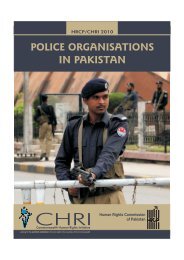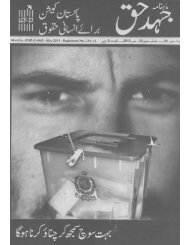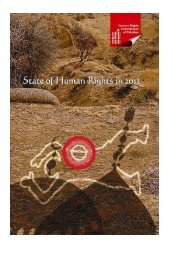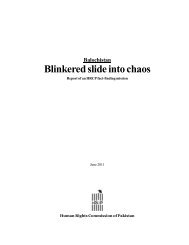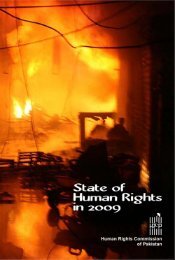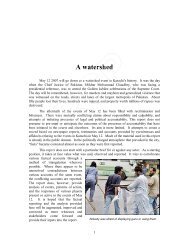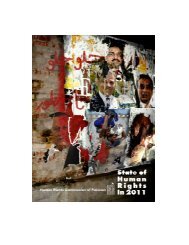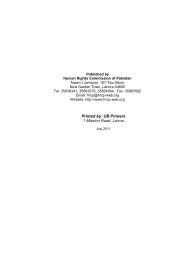Download PDF file - Human Rights Commission of Pakistan
Download PDF file - Human Rights Commission of Pakistan
Download PDF file - Human Rights Commission of Pakistan
- No tags were found...
You also want an ePaper? Increase the reach of your titles
YUMPU automatically turns print PDFs into web optimized ePapers that Google loves.
4Revisiting Police Lawsinstitutions. Consequently, due consultation could never take place and consent <strong>of</strong> the provinces was never sought. 26The provinces generally did not own the new law and were not motivated to implement some <strong>of</strong> its essential features,such as the provisions prescribing public oversight <strong>of</strong> the police functions.Second, it was tagged with the local government project <strong>of</strong> the military regime <strong>of</strong> the time. This createdproblems as the local government project ran into severe resistance from the provincial governments that wereelected later that year. 27 Also, the provincial political executive resisted any idea <strong>of</strong> granting autonomy, howsoevernominal, to the police. Bowing to the pressure, amendments had to be introduced to the Police Order, which dilutedthe original intent <strong>of</strong> the legislation. As if depriving the provinces <strong>of</strong> the power to enact police related laws was notenough, the military ruler played another trick on the people by including the Police Order, 2002 in the constitutionallist <strong>of</strong> protected laws (under Sixth Schedule <strong>of</strong> the Constitution) which could not be altered or repealed by anyprovincial legislature without his prior permission. It is another matter that the unelected ruler did not hesitate toamend the law to suit the demands <strong>of</strong> his collaborators in the provinces.The reluctance <strong>of</strong> the political executive to accept the reforms propounded in the Order <strong>of</strong> 2002 led first tothe dilution <strong>of</strong> its original provisions and later to its tardy and half-hearted implementation. The Police Order haddiluted the powers <strong>of</strong> provincial governments to exercise control over the police by conferring powers on the ZilaNazim and by prescribing formation <strong>of</strong> District and Provincial Public Safety <strong>Commission</strong>s. The provincial governments,therefore, showed unwillingness to implement the reforms envisaged in the Order. The Federal Government couldnot resist the pressures and came out with an Amendment Ordinance known as the Police Order (Amendment)Ordinance, 2004, that restored some <strong>of</strong> the powers to control police forces to the provincial political executive. 28The Amendment Ordinance was re-promulgated innumerable times. However, it was never passed by theParliament. It was promulgated as the Police Order (Amendment) Ordinance, 2007 by the Musharraf-led governmentin July 2007 and was given protection under the Provisional (Constitution) Order, 2007. The Ordinance lost itsvalidity after the Supreme Court in its famous judgment <strong>of</strong> 31 July 2009, directed all the ordinances protected underthe Provisional (Constitution) Order, 2007, to be laid before the Parliament for validation. The ordinance was laidbefore the National Assembly as a bill in November, 2009; however, it never passed through the stage <strong>of</strong> considerationby the National Assembly’s Standing Committee on the Interior. 29 This has created a serious legal confusion andvacuum. This shows the priority and the level <strong>of</strong> importance attached to issues <strong>of</strong> policing in the highest politicalechelons <strong>of</strong> this country.Third, mechanisms <strong>of</strong> public oversight and accountability provided in the new law were resisted by thebureaucracy within the police and without. The Police Order, 2002 provided two mechanisms for police oversightand accountability. The first pertained to the superintendence powers <strong>of</strong> the government that related to oversight atthe institutional level. 30 The second set <strong>of</strong> mechanisms related to public oversight <strong>of</strong> police through the Zila Nazim 31and the District Public Safety <strong>Commission</strong>s and Complaints Authorities. 32 The main domain <strong>of</strong> such institutions waspolice accountability at local level on a case-to-case basis.The Police Order <strong>of</strong> 2002 proposed the establishment <strong>of</strong> Public Safety <strong>Commission</strong>s at the federal, provincialand district levels. One <strong>of</strong> the important functions <strong>of</strong> the commissions at the provincial and district levels was to “takesteps to prevent the Police from engaging in any unlawful activity arising out <strong>of</strong> compliance with unlawful or malafide orders” 33 .Another important function <strong>of</strong> the <strong>Commission</strong>s was oversight <strong>of</strong> the police. The District Public Safety<strong>Commission</strong> comprising six elected (members <strong>of</strong> Zila Councils, national and provincial assemblies) and three nonelectedmembers was mainly responsible for: 34a. Disposal <strong>of</strong> complaints pertaining to incidents <strong>of</strong> police neglect, excess or failure or against a federallaw enforcement agency when acting in aid <strong>of</strong> civil power;b. Approval <strong>of</strong> local policing plan and while doing so ensuring that the policing priorities and allocation<strong>of</strong> police resources is in line with the citizen’s requirements. The <strong>Commission</strong>s are also required to monitor performanceagainst targets set in the policing plans;c. Preventing collusive relationship between Zila Nazim and the district police;d. Disposal <strong>of</strong> unclaimed properties taken in possession by the district police;



